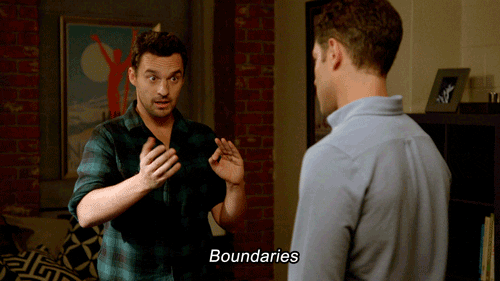I completely understand feeling incapable of saying ‘no’ to people. I know the struggle of not wanting to disappoint others to the point of constantly apologizing, agreeing to plans when I barely have time to get my coursework done, and changing myself to make other people more comfortable. For me, it started as a small response to moving cities during high school, and I didn’t even notice that I felt like a side character in my own life. I caught myself agreeing to plans in fear of disappointing others, plans that were making it significantly harder to devote the time necessary to things that mattered to me. The snap realization that I was making my bed and allowing myself to lay in it put things into perspective for me, and now I’m working on ditching my harmful habits.
As much as we want to be polite and keep all parties happy, it‘s hard to consider yourself a polite person when you aren’t being polite to yourself. You can’t please everyone, but don’t beat yourself up for trying; it’s very common to want to be well-liked, as long as it doesn’t get in the way of what you need to do to be your best self. I haven’t completely broken my people-pleasing habits, but here are a few ways we can work on prioritizing ourselves.
5 Signs you’re a people pleaser
Here’s what Choosing Therapy says are the top signs of a people pleaser and what Psychology Today suggests to fix these habits.
- you struggle to say “no”
-
Regardless of the context, if you find yourself unable to say “no” to people, even when what you’re agreeing to could harm you, stress you out, or be inconvenient, you may be a people pleaser. Not being able to say “no” is an unhealthy pattern and can present itself as a lack of respect for yourself, your needs, and your time.
How can I fix this?
To start working on setting boundaries, start by seeing how you feel so you can know your limits. Find yourself feeling uncomfortable? Take a mental note of what’s going on and why it‘s bothering you.
- you’re worried about what others think of you
-
One of the most common causes of people-pleasing behaviors, anxiety, related to another person’s opinion of you of how they’re feeling is an easy cycle to get trapped into. These feelings often stem from insecurities and are one of the most common causes of people pleasing. This can look like changing yourself to fit into a box you can fit in that satisfies others or to be more well-liked. Trust me, I’ve been here too.
How can I fix this?
Spend some time looking into what could be causing these behaviors, and how you can heal from whatever’s causing them. Being more comfortable with yourself can significantly help in not looking for external approval. Journaling is a great method to explore some of your past experiences and how they manifest in your everyday life. If you are interested in some journaling tips, look at How to Journal When You’re Feeling Down.
- you never have time for yourself
-
Always being there for others can mean you’re not leaving any time for yourself or you’re clearing your schedule and not prioritizing important things when asked for favors.
How can i fix this?
Try scheduling time for yourself and not going out of your way to be at every party and event, especially when they start to get in your way. Time for you to do what you need to get done, or do something you are passionate about is so important. Being there for yourself matters just as much as being there for others.
- you feel guilty for setting boundaries
-
Similar to feeling like you can’t say “no,” many people pleasers struggle with setting boundaries in fear of disappointing the other party. Maybe someone shamed you for setting boundaries in the past, or you just feel guilty; regardless, it’s important to express your boundaries so you can properly care for yourself.
How can I fix this?
Try to shift your perspective and stop thinking that setting boundaries is a selfish thing to do. Having connections with others shouldn’t come at your own expense. It‘s too easy to get caught up in the needs of other people and to start neglecting yourself.
- you apologize for things you don’t need to
-
People pleasing can make you feel compelled to apologize for almost anything, even when it‘s not your fault. But, feeling responsible for things unrelated to your actions is super common. So, don’t apologize for it.
How can I fix this?
Rewording simple phrases is a quick way to start shaking the “sorry” habit. For example, say you just rambled about your favorite TV show to your friend who seriously has no interest in it, instead of apologizing for your interests, try saying “Thank you for listening!” Even if you’re feeling angry or upset, don’t minimize the importance of your feelings by apologizing for them.
I hope these tips help you take some control back from people-pleasing habits. If you’re interested in more, check out Caysea Stone’s article How To Navigate Interpersonal Relationships According To UCF’S CAPS.



